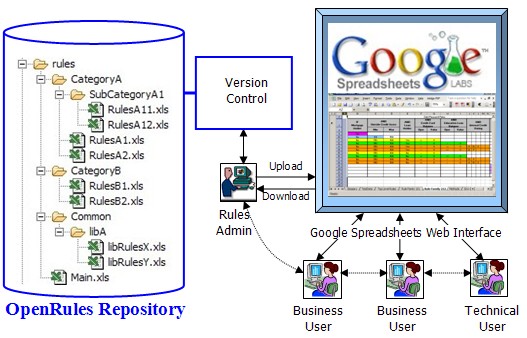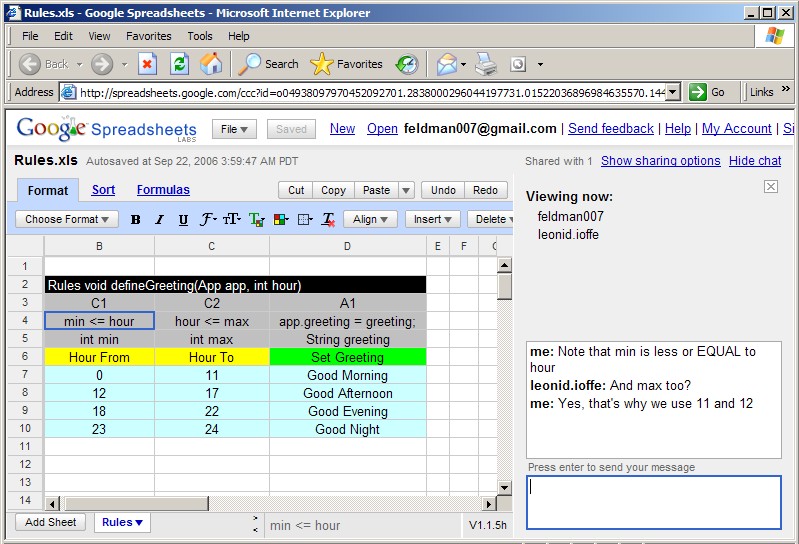Open Your Business Rules!
Rules-based
Operational Decision Services
Rule Editors
Editing business rules with popular spreadsheet tools
Excel
and OpenOffice
Google
Sheets
Rule Project Management with
Eclipse IDE
Standard Spreadsheet Editors
OpenRules uses standard spreadsheet
files to represent business rules, test data, forms,
and methods (see
Business Rules Repository
organization). It allows OpenRules customers
to use standard spreadsheet editors such as
MS Excel™,
OpenOffice™,
or
Google Docs™
as OpenRules Editors. The use of standard
tools and consequently familiar user interfaces
gives customers easy access to very
powerful features without committing them to a
lengthy learning curve.
Creating and Managing Rules with Excel and OpenOffice
Business analysts usually use MS Office tools such as MS Excel™ or Word™ to write business rules. Most rule engine vendors provide proprietary "Excel-like" tools for rules editing. Thus, after selecting any commercial BRMS, you still have to map your Excel tables into a new environment. With OpenRules both business analysts and programmers can use MS Excel directly(!) to create and edit business rules spreadsheets.
With the best table editing features available today, Excel provides powerful yet intuitive Search & Replace facilities. You may use popular Excel Plug-Ins such as QuickSearch or a free tool IceTeaReplacer that expand Microsoft Excel search possibilities to multiple files.
To prevent a user from accidentally or deliberately changing, moving, or deleting important data from a rulesheet or rulebook, you can protect certain worksheet or workbook elements, with or without a password. You may also restrict access to a workbook, worksheet, or part of a worksheet with Excel passwords, and you can remove the protection from a worksheet as needed. You may hide/show certain elements making them visible only to authorized users.
You may also use the standard Excel import/export mechanism with Extensible Markup Language (XML) that simplifies interaction with different databases and applications. Instead of Excel you can also choose OpenOffice as a good alternative.
In practical Rules Management, a Rules administrator brings different rules spreadsheets from the Rules Repository using a Version Control system. The administrator can use Excel or OpenOffice with the possible involvement of different rules analysts. After editing local copies of a rule spreadsheet, she can save the modified spreadsheet or adds a new one to the Rules Repository.
Collaborative Rules Management with Google Spreadsheets
Using Google Sheets™ a Rules Administrator can invite interested parties to share business rules spreadsheet. This includes collaborative making simultaneous changes with immediate viewing of the results. Here is a generic schema how OpenRules-based repository is maintained with Google:

Shared Rules Editing Scenario:
1. A Business Rules Administrator loads a selected rules spreadsheet from a Business Rules Repository using a Version Control system (e.g. Subversion).
2. She uploads the selected rules to Google and chooses who can access these rules. She enters the email addresses of the people with whom she wishes to share the document, and informs them with a message.
3. The people with whom the administrator shares a given rules spreadsheet can access it as soon as they sign in.
4. Multiple people can enter the rules spreadsheet all at the same time - their names will appear in an on-screen chat window. They all can discuss possible changes, make changes and/or view them instantly, and temporarily save the changes to the Google server for later discussion and action.
5. When everybody is in agreement, the administrator can then download the modified (or newly created) rules spreadsheet into the rules repository using the version control system.
Here is an example of a rules editing session
with Google Spreadsheets:

To read how to manage Rule Projects with Eclipse IDE and OpenRules Plug-in click here.

